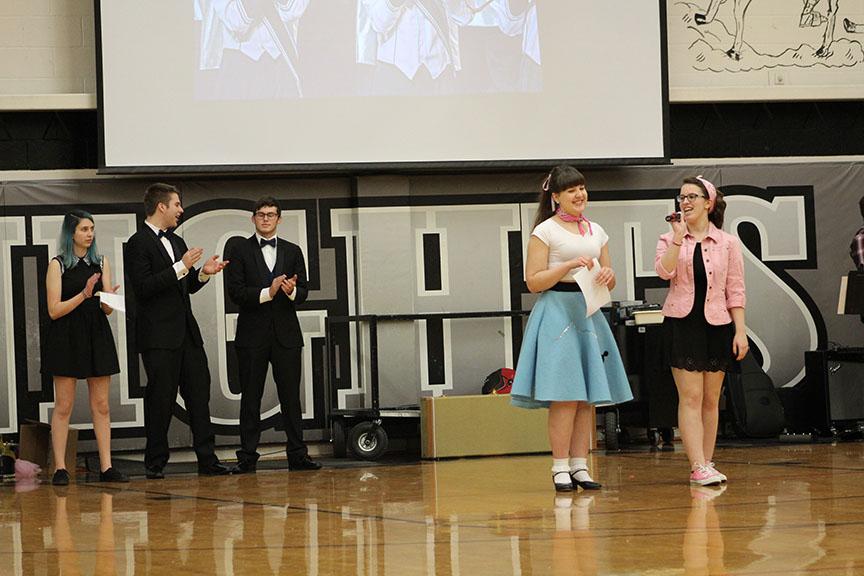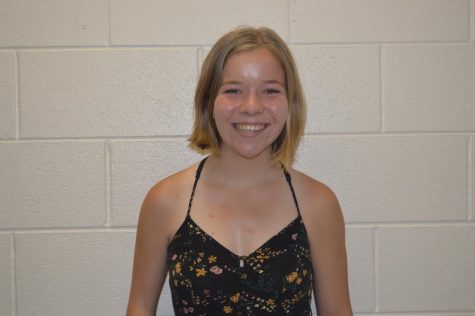Kaneland Gives Back
Photo By Emma Fugger
Seniors Aimee Frost and Julia Lemp present Nora Tomasik with a check from the Kaneland Cares Fund at the Winter assembly.
April 21, 2016
Kaneland Cares
Kaneland Cares is a fund that helps those in need within our own community. Before it started, Kaneland donated proceeds from the fundraiser event, Mr. Kaneland to Delnor Hospital for breast cancer. In 2013 Delnor made changes that affected those donations and Kaneland took the opportunity to also change their ways and create Kaneland Cares. Now they raise thousands of dollars for the community through various fundraisers and some of the proceeds of Mr. Kaneland.
“The goal is usually to raise $5,000, last year we didn’t quite get there but this year we made it,” Lori Grant said.
So far this year, they have raised about $5,650. In the past the money has gone to families suffering from cancer, house fires and to children who need medical attention.
Every year the fund also hosts a $500 scholarship in honor of Bridget Sweeney, whom Kaneland lost to cancer in 2014. She taught from 2009 to the time of her death.
This year the fund donated a check to special education teacher Nora Tomasik to aid her in adopting a special needs child from overseas.
Unsung heroes
When the word “hero” comes to mind, most think of Superman or Captain America. When “hero” pops into my mind, I think of social workers. Social workers take it upon themselves to help students at Kaneland and schools throughout the world.
Social workers in schools provide service for students who are struggling emotionally and psychologically in and outside of school. These people are heroes because they help others who can’t help themselves.
According to social worker Patrick Trapp, students often don’t want to see them because the student may worry that they will call their parents or people will think differently of them. However, that is not always the case. The meetings are completely confidential and are kept to themselves.
“I feel humbled that students come to me, seeking advice and are able to trust me,” Trapp said.
Social workers recommend doing activities such as clubs and sports to help students find what they are passionate about and create new friendships. The social workers also create groups such as grief counseling and anger management to provide support.
“Being a social worker is a very rewarding job when you feel like you’re helping the students,” Trapp said.
Social workers save the day by helping students speak to someone they are able to trust and be comfortable with when they are uncomfortable talking to a family member or a friend.
Give Blood, Save Lives
Imagine sitting in a hospital waiting room and having a doctor tell you your loved one died because they didn’t have enough blood to save them. Wouldn’t you want to save another family from that fate? According to American Red Cross, someone in the United States needs blood every two seconds.
Donating blood can save people’s lives, so anyone who can donate should. You only donate around one pint at a time. That isn’t even that much in comparison to the 10 pints in the average adult body, according to Red Cross. Also the blood that is taken is replenished in nearly 24 hours.
If you’re thinking, well someone else will donate. Hospitals don’t need that much blood, then you’re wrong. American Red Cross says the average blood transfusion is three pints, which is three donations and nearly 21 million blood transfusions happen yearly in the United States alone so hospitals need all the blood they can get.
I understand that many people are afraid of needles, but looking at the bigger picture a little needle poke is nothing compared to saving a person’s life.
Donating blood isn’t very risky or painful. As stated by the National Health Service (NHS) website, there is very few symptoms that go along with giving blood. The most common are bruising where the needle was inserted, a sore arm, and dizziness. Again, these symptoms aren’t that bad in comparison to what the blood you donate will go towards..
According the NHS almost anyone between the ages of 17 and 66 who are in good health can give blood. There are special circumstances that could prevent you from giving blood, but for the most part majority of the population are able to donate.
If you want to get involved yourself Kaneland is hosting a blood drive on Friday May 13 from 11 a.m. to 5 p.m. To give blood you during school hours you must be in a step/lunch period or study hall. You can also give blood after school. To find out more information contact student council sponsor Lori Grant.




